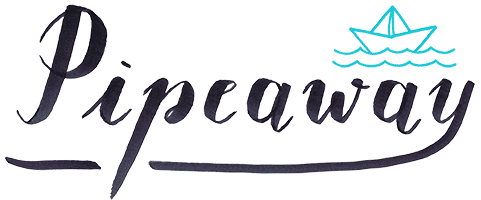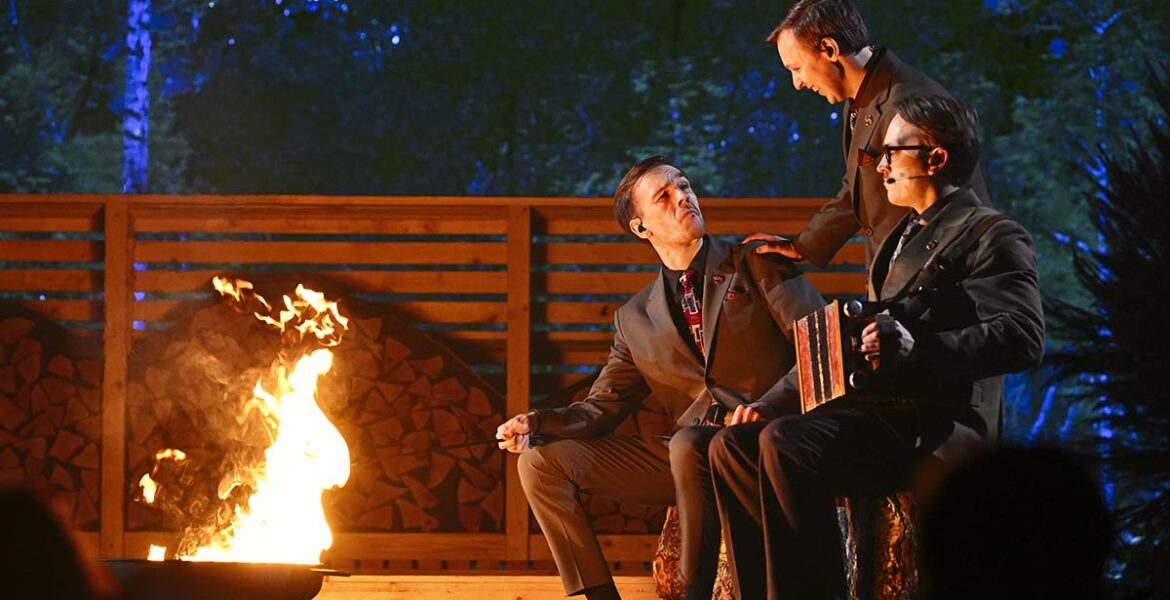Finns competing for Sweden. A Norwegian singing for Ireland. Austrians performing for Germany. The Czech Republic cheering on a Slovak. In a contest that’s technically about nations united in music, this year’s lineup looks like a musical version of the Schengen Agreement. Eurovision 2025 in Basel, a Swiss city whose borderline position is one of its tourist attractions, has an impressive number of cross-border artists – representing a nation different than their own.
The 2025 ESC is a televised game of musical chairs, where artists don’t always sit in the countries they call home
Of course, the phenomenon is not entirely new. In 1988, a 20-year-old from North America won the European music trophy in exactly Switzerland’s name. Celine Dion eventually became Canada’s greatest export (okay, if we exclude the maple syrup). Decades later, we’re back in the land that saw the singer’s potential before the world did, and the trend of blurred flags is stronger than ever.
Speaking of flags, the Eurovision Song Contest introduced the flag parade (or the parade of nations) in 2013, in Malmö – after the first Loreen’s victory for Sweden. Nobody could predict that history would repeat itself 11 years later and that the opening act of the Grand Final, with artists waving their colors as a celebrated moment of pride, would essentially become a controversial flag fiasco.
The European Broadcasting Union (EBU) insists Eurovision is a contest between broadcasters, not countries (an automatic out-of-office response whenever Israel’s participation sparks Eurovision boycott calls).
Yet, the flag parade is all about representation. Which is why EBU’s eviction of non-official flags from the Eurovision stage (including the rainbow, and Nemo’s non-binary flag) hits a sensitive spot. Restricting flags to only the represented countries (sometimes translated as prevention against potential artist protests for Palestine), seems rather outdated, especially in 2025, when identities are extremely fluid.
The 2025 ESC is a televised game of musical chairs, where artists don’t always sit in the countries they call home. What’s driving this wave of musical migration? Who’s singing for whom this year – and why?
Read how Israel, despite not winning the trophy, turned out the biggest winner of Eurovision 2025!
Cross-National Artists at Eurovision 2025
1. KAJ (Sweden): “Bara Bada Bastu”
Just a year after importing Marcus & Martinus, the “Unforgettable” twin duo from Norway, Sweden is again looking into its neighborhood for Eurovision music talent. This time, to Finland.
KAJ (short for Kevin Holmström, Axel Åhman, and Jakob Norrgård) is a comedic trio from the Vörå district, in the rural Finnish region of Ostrobothnia.
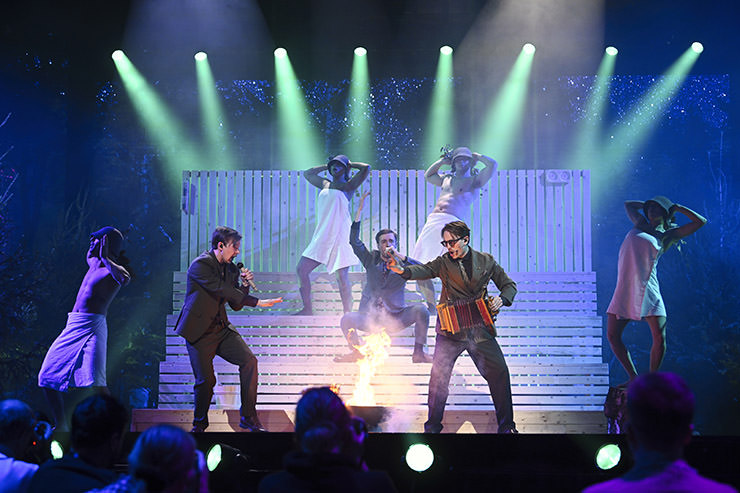
Their track, “Bara Bada Bastu”, is a euphoric hymn to – the Finnish sauna. Thus, it’s not unusual that not all of the Basel marketing for KAJ comes from Sweden. For some of it, their proud homeland chipped in.
Coincidentally, Erika Vikman, Finland’s official representative with the song “Ich Komme”, was born in Tampere, the Sauna Capital of the World. So, Finnish promoters decided to feed two birds with one scone – with joint marketing for two Eurovision competitors.
The project “Sweating for Eurovision” is bringing an authentic Finnish sauna to Basel. From May 13 to 17, between 1 and 7 pm, they will be heating it up at the Kaserne, a cultural hub by the Rhine. Just bring a towel and a swimsuit. When you see white smoke coming out of the Finnish Lounge, you can dramatically declare: “Habemus saunam!”
@eurovision don’t think I was supposed to hear this??? 👀 Eurovision2025@humorgruppen.kaj
The spokesperson of the Finnish Sauna Society, responsible for this Nordic experience in Basel, is another familiar Eurovision name. Hanna Pakarinen represented Finland back in 2007, with “Leave Me Alone”. Now a sauna ambassador, she says: “The sauna symbolizes the connection between Finland and Sweden, and now between Tampere and Vörå.”
KAJ’s appearance on Eurovision gives more to that connection than what’s visible at first glance. For a long time, Sweden has been proposing Eurovision songs in English, even French. But the Swedish language was last heard in 1998, on the Birmingham ESC stage, when Jill Johnson performed “Kärleken är”. Eurovision removed the requirement of singing in national languages in 1999. It took a quarter of a century, and a Finnish band, to resurrect Swedish on the big stage. Well, a Finnish-Swedish dialect, for a start.
If KAJ wins, Sweden will claim a record-breaking eighth Eurovision victory.
Why settle for vacations in one country? Experience the full width of Scandinavian holidays!
2. Emmy (Ireland): “Laika Party”
Sweden and Ireland are currently tied for most Eurovision wins (seven each), and Ireland seems determined to break the tie too – even if it means calling a Nordic country for backup.
The representative of Ireland at Eurovision 2025 is Emmy (full name Emmy Kristine Guttulsrud Kristiansen), an artist borrowed from Sande, a small village in – Norway.
Well, Emmy almost flew to Basel under a Latvian flag, because “Ramtai”, Citi Zēni’s 2025 entry at Latvia’s Eurovision selection Supernova (ranked 3rd), was also co-written by Emmy.
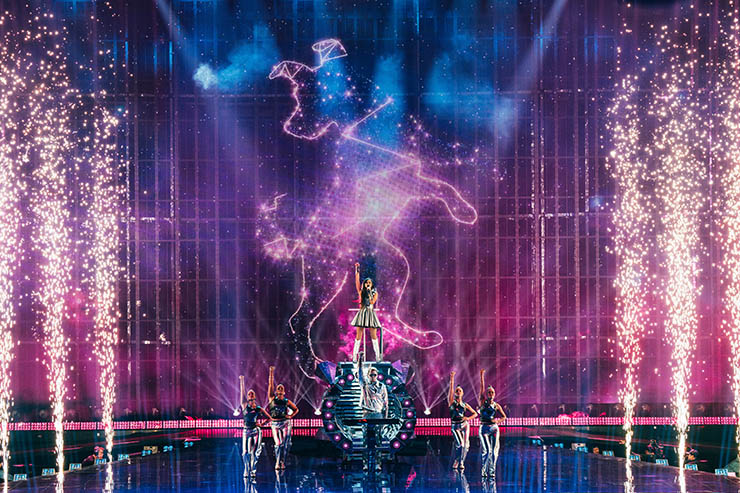
“I love Ireland so much and we’re so grateful for the support that they have shown us, and the song, it really, really means a lot, we love them”, Emmy told the PA Media agency. “I feel like it’s almost an even bigger honor to represent another country.”
But how did “Laika Party”, a Norwegian song about a Russian space dog end up on the Irish Eurovision list? Surely, the singer’s love for the country wasn’t enough.
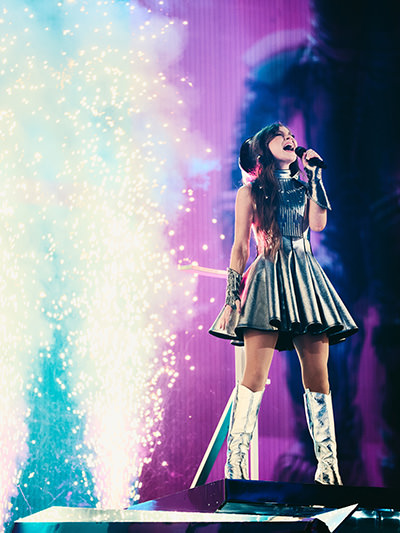
Melodi Grand Prix, Norway’s Eurovision selection, organized a songwriting camp, where “Laika Party” was conceived. But the broadcaster didn’t recognize the potential of a song celebrating Earth’s first astronaut. So the authors turned to plan B; out of five songwriters, four were from Norway, but one was from Ireland. And off they went to try their luck on the Emerald Isle. The song won over both Irish professional jury and televotes.
“It’s thanks to my being an Irish songwriter that the song could even be submitted for Ireland. Otherwise, it wouldn’t have happened”, Larissa Tormey told Offaly Independent.
So when RTÉ proudly posted about Team Ireland successfully landing in Basel, the flight they were referring to actually departed from Oslo Airport, with six flyers on board: Emmy and her brother Erlend (because sending Norwegian siblings to Eurovision is not Sweden’s privilege), Vilde Skorstad, Karin Aaeng Stuge, Kristiane Lindvik, and Christiane Bergersen. Indeed, even Irish dancers have Norwegian names. Because they are all from Norway.
Larissa, the co-author of the song that made it eligible for the Irish Eurovision pre-selection, arrives in Switzerland just a day before the semi-final.
“We’re proud of what we’ve achieved already, and we’ll be there waving the Irish flag proudly”, said Larissa who was, to make your confusion complete, born in – Russia.
Fun fact: This Nordic-Celtic crossover comes exactly 30 years after Irish violinist Fionnuala Sherry won Eurovision for Norway, with “Nocturne” (Secret Garden, ESC 1995).
3. Adonxs (Czechia): “Kiss Kiss Goodbye”
In 2025, the Czech Republic’s representative in the Eurovision Song Contest is an artist from Slovakia, a former lead singer of the London-based band Pace.
Adam Pavlovčin, aka Adonxs, was born in Myjava and spent his childhood in Senica, both in western Slovakia.
In the artist’s defense, his home country has been trying its Eurovision luck on and off. Since 1993, Slovakia sent eight songs to the competition, with the last one appearing in 2012, when Adonxs was just 17 years old.
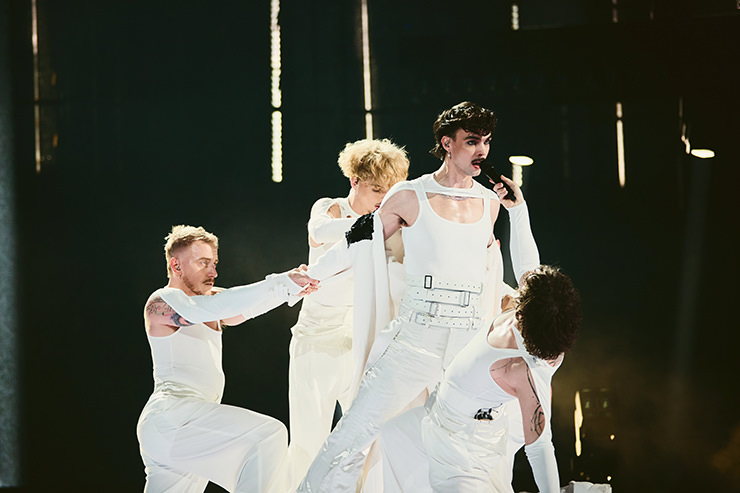
When the Czech national broadcaster ČT decided that his “Kiss Kiss Goodbye” would represent the country on Eurovision, Adonxs’ childhood dreams became a reality. The winner of the SuperStar Czech-Slovakia now has a chance to kiss Europe hello.

If we exclude former Yugoslavia, countries of Eastern Europe started appearing on Eurovision in 1993 (entire two decades after Israel!). Before the Iron Curtain fell, Czech artists could appear on Eurovision only if they would sing under someone else’s flag. Such was the case of Karel Gott, who represented Austria in 1968. Well, the same year, he also represented Czechoslovakia, but on Intervision, the Eastern Bloc’s answer to Eurovision. Boys* in Sync, a transnational performance collective, revived the alt-Eurovision and staged it in Kaserne Basel just before Eurovision. That’s an interesting story, but maybe for another article.
Meanwhile, Czechia has become Eurovision’s open-border experiment. In 2024, Russian-born, England-based Aiko represented the country with the song “Pedestal”. A year later, she even applied to represent Spain alongside her new girlfriend Kat Almagro, known as a drummer of Spanish Megara who, nota bene, competed for San Marino in Malmö.
4. Gabry Ponte (San Marino): “Tutta L’Italia”
Being the sixth-smallest country in the world, with a population that could easily fit into St. Jakob-Park stadium, San Marino’s pool of local artists is rather limited. Valentina Monetta, therefore, managed to represent the microstate four times, in 2012, 2013, 2014, and 2017.
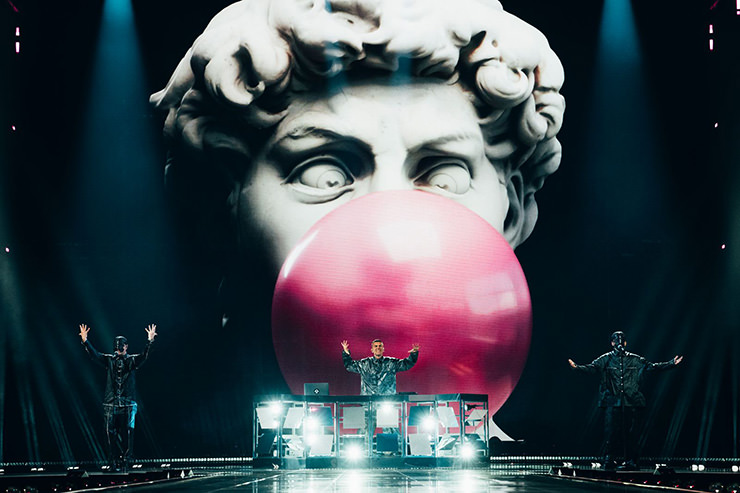
To mix things up a bit, San Marino occasionally needs to borrow artists from Turkey, United States, Malta, Germany, or Spain. Knowing the country’s talent limits, an incredible number of 1,200 artists from 48 countries sent their songs for the 2025 competition – eight applications arrived from Suriname, South America!
Of course, the most common and easiest way to handle the market constraints is by engaging an act from Italy, a country that surrounds San Marino from all sides.
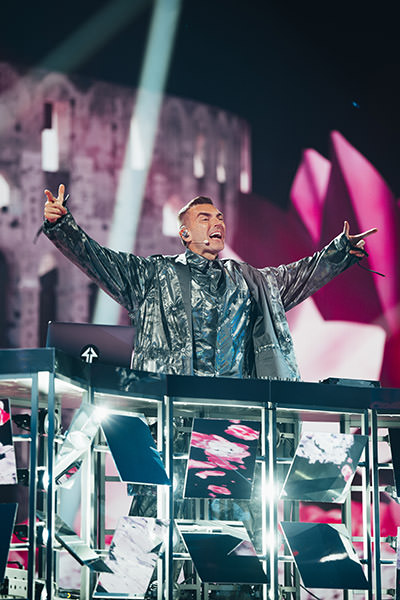
In fact, the 2025 song is literally singing “Tutta L’Italia”! The song debuted on Italian television, at Sanremo Music Festival, the Italian Eurovision selection show. “Tutta L’Italia” went viral as the ad-break theme of the festival.
The author, Gabry Ponte, an Italian DJ whose path to international fame started with a hit “Blue (Da Ba Dee)”, entered the Una Voce Per San Marino with “Tutta L’Italia” song, and managed to seize the opportunity to represent the small nation on Eurovision.
This is not the first time that Ponte, as one of the top three most-streamed Italian artists, represents another country on EBU’s competition. In 2022, he co-wrote “Halo”, a song that represented Austria (DJ Lumix and Pia Maria).
5. Marko Bošnjak (Croatia): “Poison Cake”
It’s not known whether Croats (whose stonemason founded San Marino in 301 AD) send their entries to the competition. But Croatia certainly accepts proposals from abroad.
The recipe of “Poison Cake”, Croatia’s newest song on Eurovision, is truly international: songwriters come from the UK, Ireland, and the Netherlands.
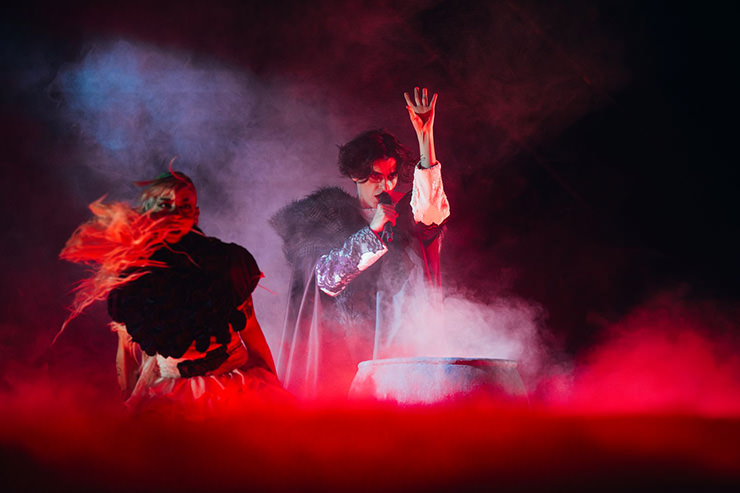
But even Marko Bošnjak, who co-wrote the music he performs, originates from Croatia’s first neighbor. His last name is literally an archaic version of the word Bosnian. Marko was born in Mostar, and raised in the small village of Rama, in Bosnia and Herzegovina.
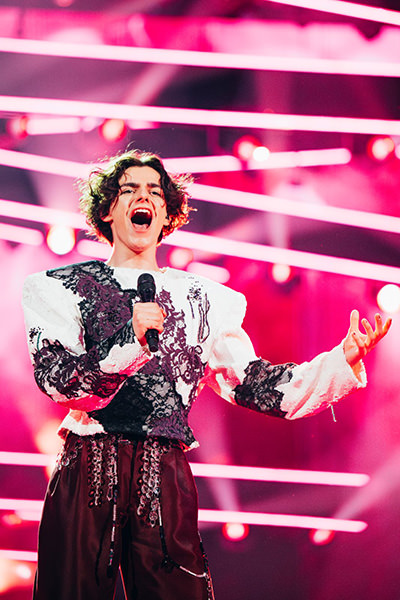
After discovering the joy of singing in a local church choir, his first public appearance was in Serbia – where he won the “Pinkove zvezdice” talent show, at age 11. Marko’s first music steps relied on sevdalinka, a traditional folk music of his country.
In 2018, the Croatian cellist Ana Rucner (another cross-border artist, who represented Bosnia and Herzegovina on their last Eurovision appearance in 2016) discovered the Bosnian music prodigy, and recorded “Ashes”, a Celine Dion cover, with him.
Marko’s early successes brought him into the spotlight – and unfortunately into school bullying. So he decided to leave his rural homeland behind and continue his high school in Zagreb, the capital of Croatia, a country he proudly represents today.
6. Abor & Tynna (Germany): “Baller”
For Eurovision 2025, Germany sends Abor & Tynna, a brother-sister duo performing “Baller”.

The siblings were, however, born and raised in Vienna, the capital of Austria. And no, even their roots are not German, but Hungarian-Romanian. If you’d check their IDs, you’d see their real names are Attila and Tünde Bornemisza.
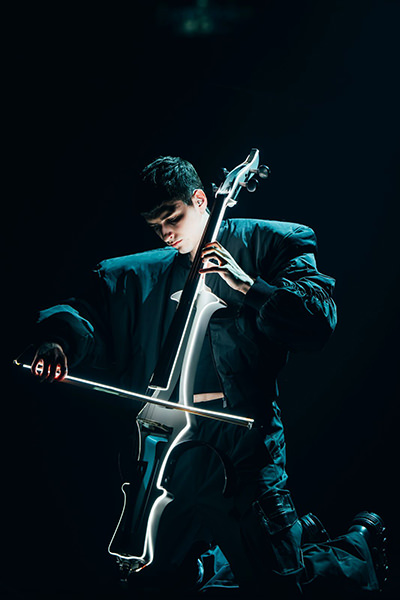
The father, Csaba Bornemisza, a cellist with the Vienna Philharmonic Orchestra, instilled a deep love for music in his children at a young age.
After classical music training, Abor & Tynna still gravitated toward a cocktail of pop, hip-hop, and electronic genres.
The last song with German lyrics played on Eurovision in 2007. It was Roger Cicero’s now already forgotten “Frauen regier’n die Welt”.
Similar to Sweden’s case, after nearly two decades of competing with songs in English, it took a pair of non-Germans to bring the German language back to Eurovision.
Flags Without Borders
A special level of political and cultural challenges comes when artists from regions with strong local identities present a country, and yet they are not even allowed to wave their flags. In 2025, we find two examples of autonomous territories silently representing a country they are autonomous from. Sissal, for instance, originates from Tórshavn in the Faroe Islands but performs her “Hallucination” for Denmark. This mirrors Faroese singer Reiley, who did the same in 2023 with “Breaking My Heart”. Napa, from Madeira, represents Portugal. Nearly 1,000 kilometers away from the country’s capital, it’s a place with a strong regional identity, but also a place people leave from, looking for bigger life. Napa’s song “Deslocado”, similar to Baby Lasagna’s message in “Rim Tim Tagi Dim”, portrays exactly this kind of not-always-voluntary displacement. As drummer João Rodrigues puts it for Eurovisionworld: “The song isn’t just about the Madeira Islands’ people. It’s a song about students and workers who leave their country looking for better opportunities elsewhere. It’s a transversal message and it certainly can resonate with Europe, a continent with open borders where it’s easy to go from one place to another.” That’s maybe similar to all cross-border artists who look for their place under the Eurovision sun, disregarding the flag they’ll have to wave at the old-fashioned parade.
7. JJ (Austria): “Wasted Love”
So, if Austrians are singing for Germany this year, who’s singing for Austria, I hear you ask.
ORF’s representative on ESC 2025 is JJ, or Johannes Pietsch, one of several Eurovision representatives who come with an interesting mixed heritage.
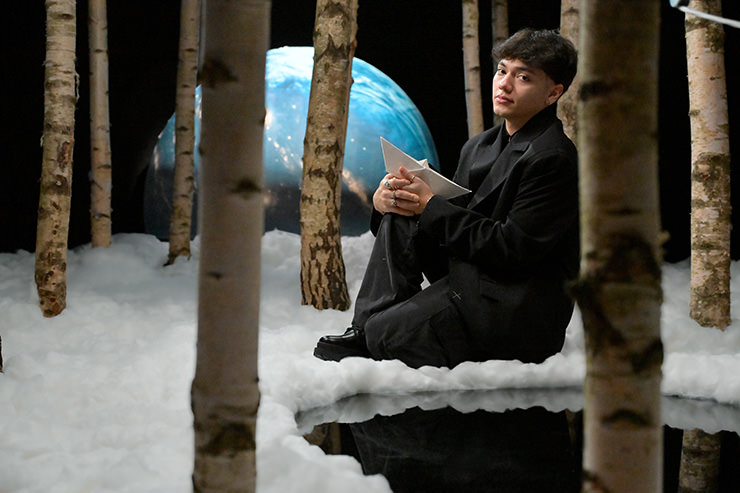
Born in Vienna to a Filipino mother, JJ was raised in Dubai, made his TV debut in the UK (The Voice), then dipped his toes into Germany (Starmania talent show). Now he’s Austria’s best shot at winning Eurovision.
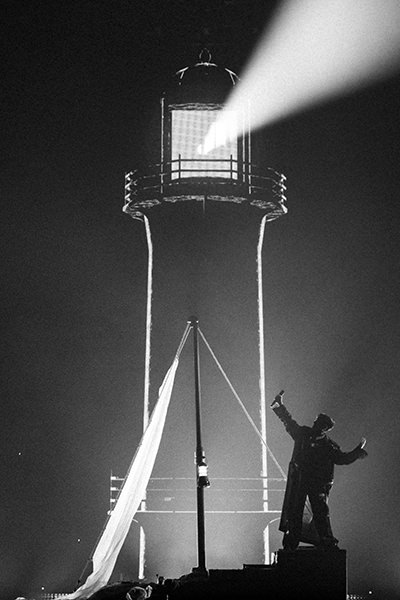
JJ is, however, not the first person with Filipino roots singing for Austria. In 2021, the country’s Eurovision representative was Vincent Bueno, with “Amen”, a song about getting a closure after a heartbreak.
The countertenor JJ delivers a pop-opera ballad to Eurovision, also a breakup song that transforms into a techno banger. You wouldn’t necessarily expect that from a student of classical music and performer for the Vienna State Opera.
Behind the song is Teodora Špirić Teya, a Serbian descendant who represented Austria in 2023 with “Who the Hell Is Edgar?”. If Miriana Conte’s “Serving” weren’t such a strong song, Teya would be traveling to Basel with Malta too, as she co-wrote the song “Heaven Sent” for Kristy Spiteri who eventually finished second at this year’s MESC (Malta’s ESC).
8. Kyle Alessandro (Norway): “Lighter”
Like his “Eurovision brother” JJ, Norway’s representative Kyle Alessandro also has a multicultural background.
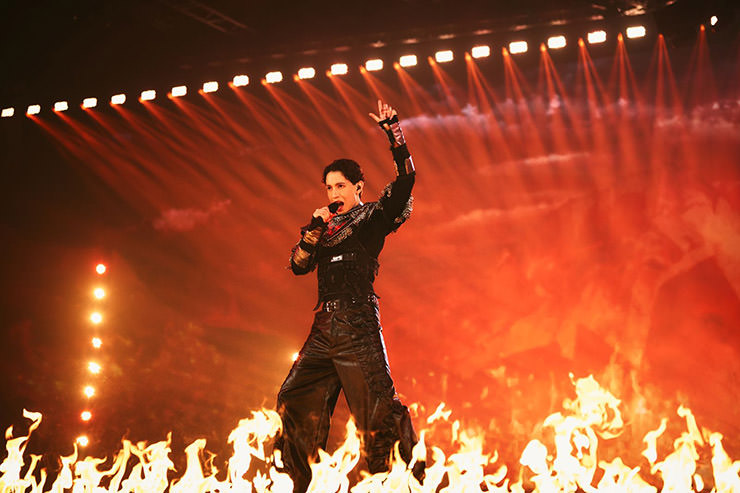
His father’s family comes from Malaga in Spain, so when he approached his colleague Melody in fluent Spanish, the official representative of España seemed quite surprised.
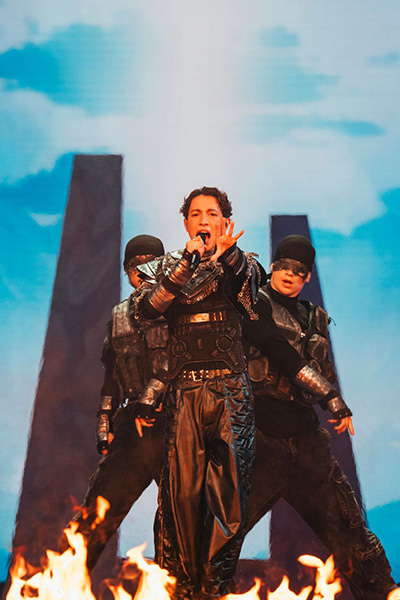
“I’ve gotten so much support and love. I feel very safe knowing that Norway wanted me to represent them”, Kyle told Eurovisionworld.
Only 19 (which makes him the youngest participant in this year’s Eurovision), but already multilingual (he speaks four languages), Kyle delivers a high-energy song on a serious topic. “Lighter” is a powerful anthem he wrote after his mother was diagnosed with cancer and told she had only six months to live.
Inspired by Spanish artists like Chanel and Angelina Mango, the Norwegian Eurovision entry blends the country’s folk music with Spanish rumba flamenca.
Kyle wrote the song with the help of Adam Woods, a songwriter from – Sweden. As for moral support, Kyle Alessandro frequently mentions Alessandra, an Italy-born representative of Norway in 2023, with “Queen of Kings”.
9. Claude (Netherlands): “C’est La Vie”
For the first time ever, the Netherlands shows up at Eurovision with a song in French, the official language of the Democratic Republic of the Congo.
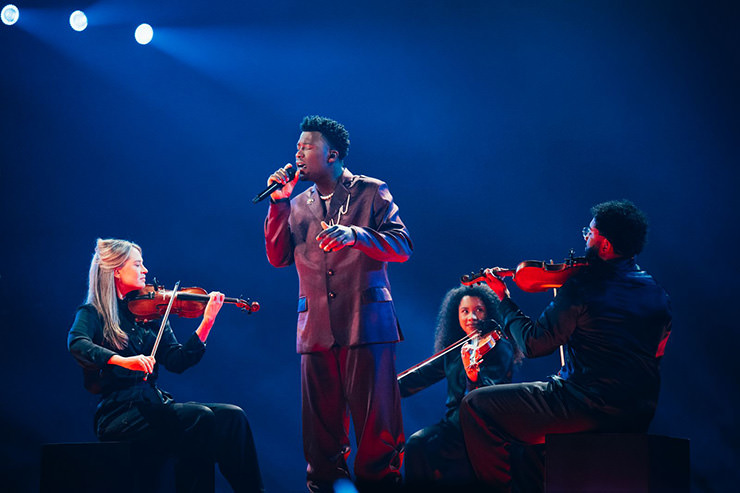
Claude Kiambe is a Congolese who moved to Europe at age nine, with a mom who inspired him to create a song titled “C’est La Vie”.
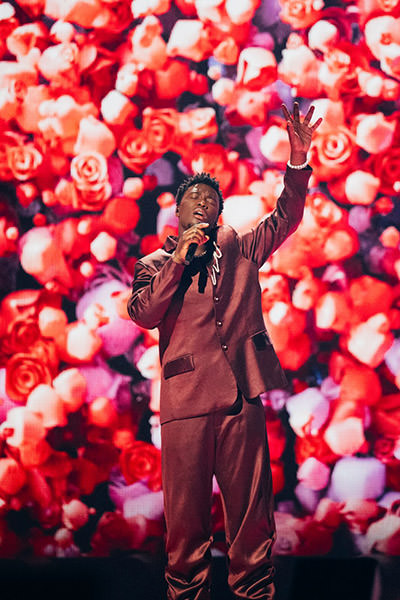
Dedicated to the hardships of his earliest life memories, Claude, just like Kyle, reflects on his mom’s advice on what to do when things don’t go as planned.
French, as his native language, is Claude’s first choice when creating music. Even his debut album, released in 2024, was named “Parler Français”. Now chosen among 331 entries, a Dutch song joined four other countries that decided to sing entirely or partly in French in 2025.
It’s not the first time that the Netherlands has brought artists with non-European roots to Eurovision. In 2021, Jeangu Macrooy, an artist from Suriname, sang a Dutch Eurovision entry in a mix of English and Sranan Tongo.
10. Mamagama (Azerbaijan): “Run With U”
Azerbaijan, a country where 97% of the population is Muslim, has chosen one of its 12,000 Jews to represent them in 2025.
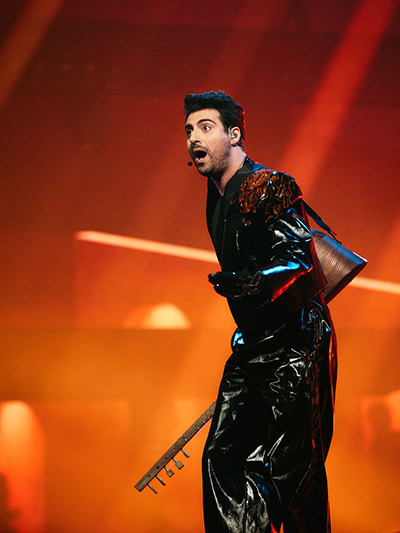
Mamagama is a trio featuring bass guitarist Hasan Heydar (half-Arab-Lebanese), the drummer Arif Imanov (Azeri), and the singer Asef Mishiyev (Jew by nationality).
“We are an international band – the model of tolerant Azerbaijan”, the Mountain Jew singer who speaks Farsi, and lived in Moscow for 15 years, said in The Jewish Chronicle.
For staging of “Run With U”, Azerbaijan chose to work with a Japanese-Brazilian choreographer Jorge Antonio Fujizaki. Besides helping out three Azerbaijan boys, the same choreographer is designing movement for the three UK girls – Remember Monday’s “What The Hell Just Happened?”.
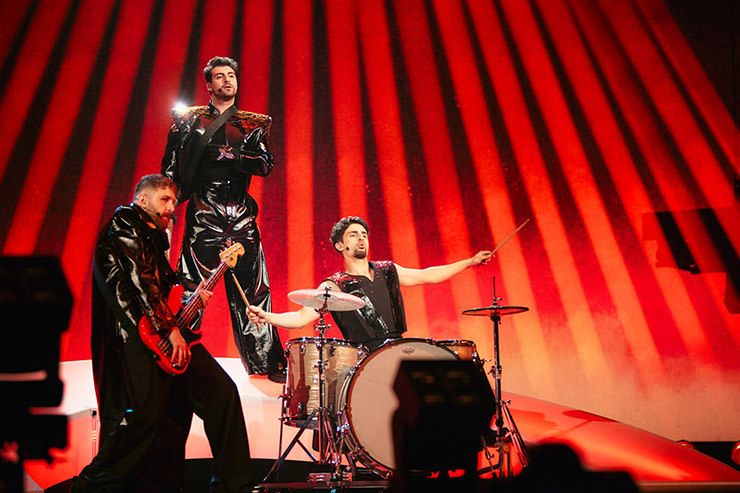
Borrowing vision
Eurovision staging can transform a flop into a hit, or vice versa. That’s why delegations increasingly turn to the acclaimed outside choreographers. For instance, Armenia’s PARG for his song “Survivor” sought help from Greece. The choreographer of this Eurovision act is Eirini Damianidou, last year’s dancer in Marina Satti‘s “Zari”. But the most wanted name among foreign delegations in 2025 is Sergio Jaén, a Spanish creative director who gained Eurovision-level fame after designing Bambie Thug’s horror-theater staging for “Doomsday Blue”. This year, he oversees three ESC performances, all of which were the most talked about sight unseen. Austria’s JJ, Finland’s Erika, and Cyprus’ Theo Evan all prepared a show with Sergio’s artistic signature. Speaking of Cyprus: for the first time since 2017, they’re sending someone actually born on the island. Recent Cypriot acts hailed from Albania, Georgia, Germany, Greece, and even Australia.
History of Eurovision Cross-Border Artists
Talent outsourcing is not a new Eurovision phenomenon. Here are some notable examples of the history of cross-border acts:
- 1962: French singer Jean Philippe Gargantiel, who represented his homeland on Eurovision 1959 (“Oui, oui, oui, oui” came third), returned to the competition as a representative of Switzerland. His “Le Retour” was not as welcomed as his first song – he got only two points.
- 1964: French singer Romuald Figuier, who never sang for France on Eurovision, premiered representing Monaco, with “Où sont-elles passées”, and finished third. Again, his returns in 1969 (for Luxembourg), and in 1974 (for Monaco again) were less successful.
- 1969: Swedish schlager star Siw Malmkvist, whose song “Alla andra får varann” finished tenth in 1960, returned to Eurovision as a representative of West Germany – “Primaballerina” placed seventh.
- 1973: Anne-Marie David, a Moroccan-French singer won Eurovision for Luxembourg, with the song “Tu te reconnaîtras”. Six years later, she would compete for France, with “Je suis l’enfant soleil”.
- 1974: Ireen Sheer, a British singer living in Germany (received German citizenship in 2020), premiered on Eurovision for Luxembourg, with “Bye Bye, I Love You”, ending up in fourth place. Her comebacks were less successful: under a German flag in 1978 “Fire” finished sixth, while “Children, Kinder, enfants”, again for Luxembourg, came thirteenth.
- 1982: Elisabeth Andreassen (Bettan), a Norwegian artist born in Sweden capitalized on both countries. As a Swedish act, she finished eight with the song “Dag efter dag” (Chips). Three years later, she would come back with Bobbysocks, and their song “La det swinge” would win the competition on Norway’s behalf.
- 1988: Céline Dion, the French-Canadian icon won Eurovision for Switzerland, with the song “Ne partez pas sans moi”.
- 2005: The famous all-female rock band Vanilla Ninja from Estonia, after failing to qualify at their domestic territory, got a chance to represent Switzerland with the song “Cool Vibes”.
- 2005: The same year, a mixed girl group Feminnem competed for Bosnia & Herzegovina with “Call Me”. Five years later, they stood on the Eurovision stage under the Croatian flag, performing the song “Lako je sve”.
- 2009: Following a dispute with the procedure of her home country’s competition for Eurovision, Anastasia Prikhodko from Ukraine performed the song “Mamo” as a representative of – Russia. Today, she is a politician and vowed never to sing in the Russian language again.
- 2015: After Ukraine canceled its participation in Eurovision, Ukrainian singer Eduard Eduardovych Romanyuta managed to appear as a representative of Moldova, with the song “I Want Your Love”.
- 2017: Half-Italian Nathan Trent tried to compete for two countries in the same year – Austria and Germany. Austria selected his song “Running on Air” as Eurovision entry first, so Germany automatically disqualified him.
- 2018: After several rejections at her home country’s pre-selection for Eurovision, Albanian-born Greek singer Eleni Foureira was adopted by Cyprus. Her “Fuego” finished second, achieving the country’s best Eurovision result ever.
- 2021: Italian singer Senhit and American rapper Flo Rida represented San Marino, with the song “Adrenalina”.
Cross-Border Artists on Eurovision – Conclusion
In a competition that waves 37 flags but showcases many more backgrounds, it’s becoming harder – and frankly, less relevant – to define what it means to “represent” a country at Eurovision. From Filipino-Austrians to Congolese-Dutch, Faroese-Danes to Hungarian-Germans raised in Vienna, 2025 might be the most cross-border, multilingual, and genre-fluid edition yet.
The scoreboard still sorts contestants by national abbreviations, but the music itself couldn’t care less about borders. Eurovision today is less about where you’re from and more about where your story and your song can take the audience. For many artists, that journey is pan-European by default.
At the melting pot called Eurovision, there are no national residency requirements, and nobody is checking anyone’s birth certificate backstage
The European Broadcasting Union in the current controversial era that bans even rainbow symbols on its stage, claims that it needs “no flag to demonstrate its alliance and celebration of the LGBTQ+ community”. And yet, it seems stubbornly glued to the concept of national flags, as if the “alliance and celebration” of that community (called Europe) needs to be demonstrated in the most literal way – waving pieces of cloth. In fact, if there is a flag that would be a symbol of that “alliance and celebration”, the EU flag would be closest to it. However, nowadays, even that one is officially banned from the program.
For a contest that claims to be a competition between broadcasters, and not governments, Eurovision certainly seems quite engaged in insisting on the pride symbols of the old world, and simultaneously strongly opposes newer symbols that erase borders and celebrate individuality.
At the melting pot called Eurovision, there are no national residency requirements, nobody is checking anyone’s birth certificate backstage, and ultimately, none of this should even matter in a competition that promises to unite Europe through song.
So instead of making decisions that create tensions and controversies, maybe the EBU should proudly acknowledge Eurovision’s history of diversity, stop policing flag-smuggling artists who dare to identify differently or stand for what they think is right, and let everyone just be. Otherwise, we will be writing about the politics of the non-political competition for years to come.
Did you like this overview of the Eurovision cross-national artists?
Pin it for later!
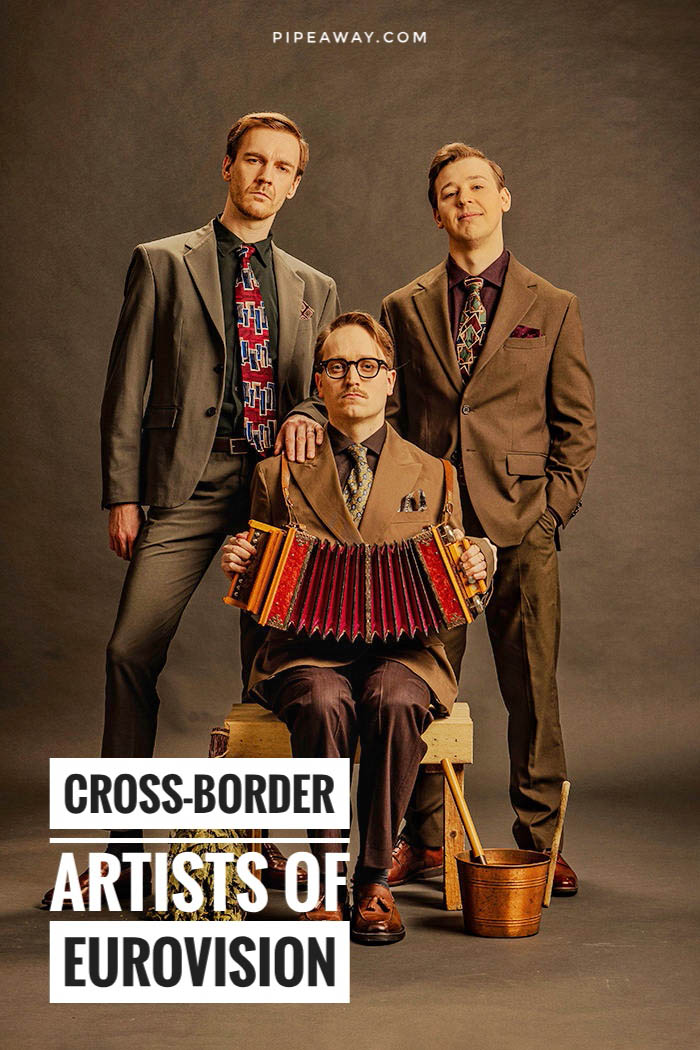
Disclosure: This post may contain affiliate links, meaning if you click on them and make a purchase, Pipeaway may make a small commission, at no additional cost to you. Thank you for supporting our work! The authors of all photographs are mentioned in image titles and Alt Text descriptions. In order of appearance, these are: KAJ (cover and in-article photo) - Stina Stjernkvist / SVT Emmy (horizontal), Gabry Ponte, Marko Bošnjak, Abor & Tynna, JJ (vertical), Kyle Alessandro, Claude - Sarah Louise Bennett / EBU Emmy (vertical), Adonxs (horizontal), Mamagama - Alma Bengtsson / EBU Adonxs (vertical) - David Urban JJ (horizontal) - Thomas Ramstorfer / ORF KAJ (pin image) - Erik Ahman
